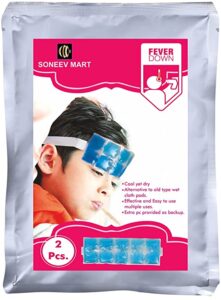Fever is defined as an elevated body temperature that exceeds the normal body temperature. Body temperature is nothing but a degree of hotness or coldness of a body. Body temperature varies slightly from one person to another person. The fever condition is also called high temperature, hyperthermia, and pyrexia. The hypothalamus present in the brain is responsible for maintaining body temperature. Fever plays an important role in the body’s defense against infections. Fever can cause due to infections, illness, or maybe some other cause.
Normal body temperature
For adults, body temperature is between 97F to 99F Or 37 degrees Celsius.
For children or babies 97.9-100.4F Or 36.5C – 38C
Fever temperature
For adults – above normal – 38.1-42.2degree C
For children – 38.5-42.2 degrees C
Note: The normal body temperature varies from one person to another person, it can vary with age and time of day.
Click Here To Buy
What is considered a fever?
If the temperature of the body is higher than normal then it is called fever. The
average temperature is 98.6F (37C). An oral temperature (temperature taken by using mouth) is 100F(37.8C) or higher is generally considered as a fever.
FEVER SYMPTOMS:
The symptoms of the fever are mainly depending on what’s causing a fever, which may include,
• Elevated temperature (above normal)
• Sweating
• Muscle aches
• Chills and shivering
• Loss of appetite
• Irritability
• Dehydration
• Weakness
• Fatigue
• Bacterial infections
• Dizziness
• Sensitivity of light
• Headache
• Vomiting/Nausea
• Flushed complexion (hot skin)
• Cold sores
• Sore throat
• Runny nose
• Abdominal pain
• Skin rashes
The serious symptoms include
• Breathing problems
• Cognitive issues (confusion)
• Seizures
• Strange behavior
• Loss of appetite
• Pain while urinating
• Stiff neck
• Inflammation
• Altered speech
• Severe headache
• Pain in muscles and joints
STAGES OF FEVER:
- Fever >37 C Or > 98.6 F
- High fever 39.4-40C Or 103-104F
- Very high fever 40.5- 41.1C Or 105-106 F
- Hyperthermia >41.1C Or > 106C
Generally, fever settles on its own within 1-3 days. However, continuous fever may start or reoccur for up to 14 days.
• Acute fever – the duration is less than 7 days
• Sub-acute fever – fever lasts for up to 14 days
• Chronic fever – fever continues for more than 14 days
4 BIOLOGICAL ROLES OF FEVER:
Fever plays an important role in the body’s defenses against infections,
• Activates the production of T cell
• Prevents the replication of some viruses / Bacteria
• Increase phagocytosis
• Increase production of Ig antibody
CAUSES OF FEVER:
Some causes of the fever include,
• Viral infection(flu or cold)
• Bacterial infection
• Fungal infection
• Food poisoning
• Inflammation
• Due to health conditions like asthma, kidney disease, rheumatoid arthritis, diabetes, liver disease, etc.
• Heat exhaustion (overheating of the body)
• Sunburn
• Intake of medication for a prolonged period of time leads to serious febrile illness
• Vaccination
• Antibiotics
• Cancer
• Autoimmune conditions
• Blood clots
• Pneumonia
• Side effects of medication
• Dehydration
• Gastroenteritis
• Urinary tract infections
TYPES OF FEVER:
Depending upon the cause fever may be categorized as
1. Intermittent fever: Fever caused by bacterial infections. The body temperature is normal in day times but it increases at night.
2. Sudden high fever: fever caused by dengue which causes a sudden rise in body
temperature
3. Remittent or continuous fever: this form of fever is also caused by bacterial
infections include pneumonia.
4. Rheumatic fever: caused by streptococcal bacteria. It may develop symptoms like throat infection, white spots on the tongue, inflammation, etc.
COMPLICATIONS OF FEVER:
If fever is left untreated it may lead to serious complications like,
1. Seizure: Development of febrile seizure in children between the age of 6
months to 5 years and febrile seizure usually happens on the first day of fever.
Although they can be frightening.
It usually stops on its own after a few minutes and doesn’t cause any other health problems. Signs and symptoms of a febrile seizure include jerking movements, loss of consciousness, and May moan.
2. Brain damage
3. Hallucinations
4. Coma
5. Even may cause death
DIETARY MANAGEMENT OF FEVER:
• A well-balanced diet for fever is very important to boost the immune system to fight against infections.
• During fever need for essential nutrients like vitamins A, B, and C and minerals like
calcium and sodium are necessary.
• Foods to be taken during fever include Fruit juices ( citrus fruits), Milk, Coconut water, Boiled eggs, Vegetables, Custard, and Steamed fish.
• Foods to be avoided during fever include,
Ghee
Fried foods
Red meat
High fibrous foods
Spicy foods
Beverages
Alcohol
Click Here To Buy
HOME REMEDIES:
• A person with a fever should be kept comfortable
• Drink plenty of water and fluids
• Avoid taking cold baths instead use lukewarm water
• Take proper rest
• Avoid intake of alcohol and other caffeinated beverages which can contribute to
dehydration
PREVENTION OF FEVER:
• Good hygiene practices like washing hands regularly, using hand sanitizer, covering your mouth while coughing, etc.
• Don’t share your personal belonging such as water bottles, towels, glasses, eating
utensils, etc. With other people.
• Avoid touching your nose, mouth, or eyes
DIAGNOSIS OF FEVER:
• Fever can be easily diagnosed by using a thermometer that measures the body temperature. There are several types of thermometers available. Oral, rectal, and ear thermometers are commonly used.
• By conducting a physical examination. Doctors will ask questions about the
symptoms and conditions, medical history, and other infection risks.
• By taking nasal or throat samples to test respiratory infections
• By conducting lab tests such as urine tests, blood tests, and chest X-rays
TREATMENT OF FEVER:
The treatment prescribed will depend on the cause of the fever
OTC (over-the-counter) medications: The otc medication such as acetaminophen or ibuprofen are recommended for the treatment of fever. These medications will help in decreasing body temperature and give relief from pain.



